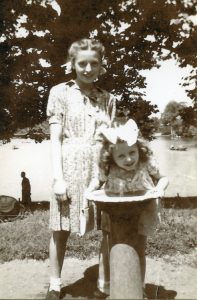The Tillamook Air Museum is proud to announce the forthcoming debut of our latest exhibition, “Spots of Light: To be a Woman in the Holocaust,” a collaborative endeavor with Yad Vashem, the World Holocaust Remembrance Center. The grand opening will be on Sunday April 28th at 1 pm. This significant exhibition illuminates the remarkable resilience and courage exhibited by women amidst the harrowing backdrop of the Holocaust.
As an integral component of the exhibit’s premiere, and in collaboration with Oregon Jewish Museum and Center for Holocaust Education in Portland, Oregon, we are privileged to welcome guest speaker Eva Erica Aigner, a Holocaust survivor, who will share her compelling first-hand account of survival and perseverance amid the darkest chapters of human history. Ms. Aigner’s narrative serves as a poignant testament to the enduring strength of the human spirit in the face of unimaginable adversity. Additionally, Sue Johnson, daughter of Eva Erica Aigner, will offer poignant reflections on her father Leslie Aigner’s experiences as a survivor of the Auschwitz concentration camp, providing a multigenerational perspective on the lasting impact of the Holocaust.The presentations by Eva Erica Aigner and Sue Johnson will be followed by an interactive question and answer session, providing attendees with an opportunity for meaningful reflection. After the conclusion of Eva & Sue’s presentation, they will help us inaugurate our exhibit by “cutting the ribbon.”
The exhibit Grand Opening and talks by Eva & Sue are FREE to the public.

Eva Erica Aigner (nee Speigel), one of two daughters, was born in 1937 in Košice, Czechoslovakia. Eva’s mother stayed at home with her and her younger sister while her father ran his own hat-making business until his business license was revoked in 1939 because he was Jewish. Soon the family moved to Budapest, Hungary, joining other family members in the hopes of escaping Nazi extremism. Eva was enrolled in school in Budapest, but by the end of 1943 she had to leave the first grade due to worsening antisemitism. Eva’s father was later taken to a slave labor camp where he was killed.
In Budapest, Eva, her mother, and her younger sister lived with several family members in Jewish housing that was marked with a yellow star. Eventually all residents were either selected for immediate deportation to concentration camps or forced into the Budapest Ghetto. Eva’s mother was among those selected for deportation, and in the aftermath, many children, including Eva and her sister, were taken to the Danube river front to be lined up and shot by the Nazis. Eva’s mother was able to escape the deportation train, find her way back to Budapest and the Danube river, bribe a guard, and save her daughters from being shot. Realizing there were no safe places outside of the Ghetto for a Jewish mother and her children, Eva’s mother snuck her and her children into the Budapest Ghetto where they remained until Russian troops liberated the Ghetto in January of 1945.
Eva eventually finished school and in 1956 she met and married her husband, Leslie. Five months later, the Hungarian Revolution broke out, and on Christmas Eve, Eva and Leslie, along with Leslie’s father and step-mother escaped over the Hungarian/Austrian border. They boarded an American troop carrier with numerous other refugees and came to settle in Portland, Oregon. Eva worked in cosmetology for many years and later operated her own salon.
After local Holocaust deniers became vocal in the late 1980s, Leslie and Eva began sharing their story with audiences far and wide. They have worked with the Holocaust Memorial Coalition since its inception in 1994, and Eva was the vice chair of the project to build the Oregon Holocaust Memorial.
Tillamook Air Museum’s newest exhibit “Spots of Light: To Be a Woman the Holocaust” is a powerful reminder of the six million lives that were lost in the Holocaust, in one of the most horrific acts perpetrated against our fellow man. It should serve as a lasting remembrance of the consequences when ignorance, hate, and misunderstanding take root. In fact, no one said it better and more powerfully than did Rod Serling, when he said, “All the Dachaus must remain standing. The Dachaus, the Belsens, the Buckenwalds, the Auschwitzes-all of them. They must remain standing because they are a monument to a moment in time when some men decided to turn the Earth into a graveyard. Into it they shoveled all of their reason, their logic, their knowledge, but worse of all, their conscience. And the moment we forget this, the moment we cease to be haunted by its remembrance, then we become the gravediggers.”
For more about the exhibits at the Tillamook Air Museum, go to www.tillamookair.com


